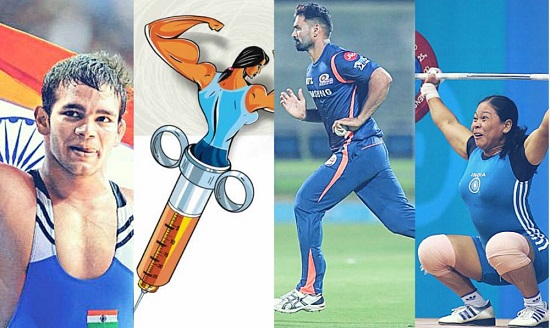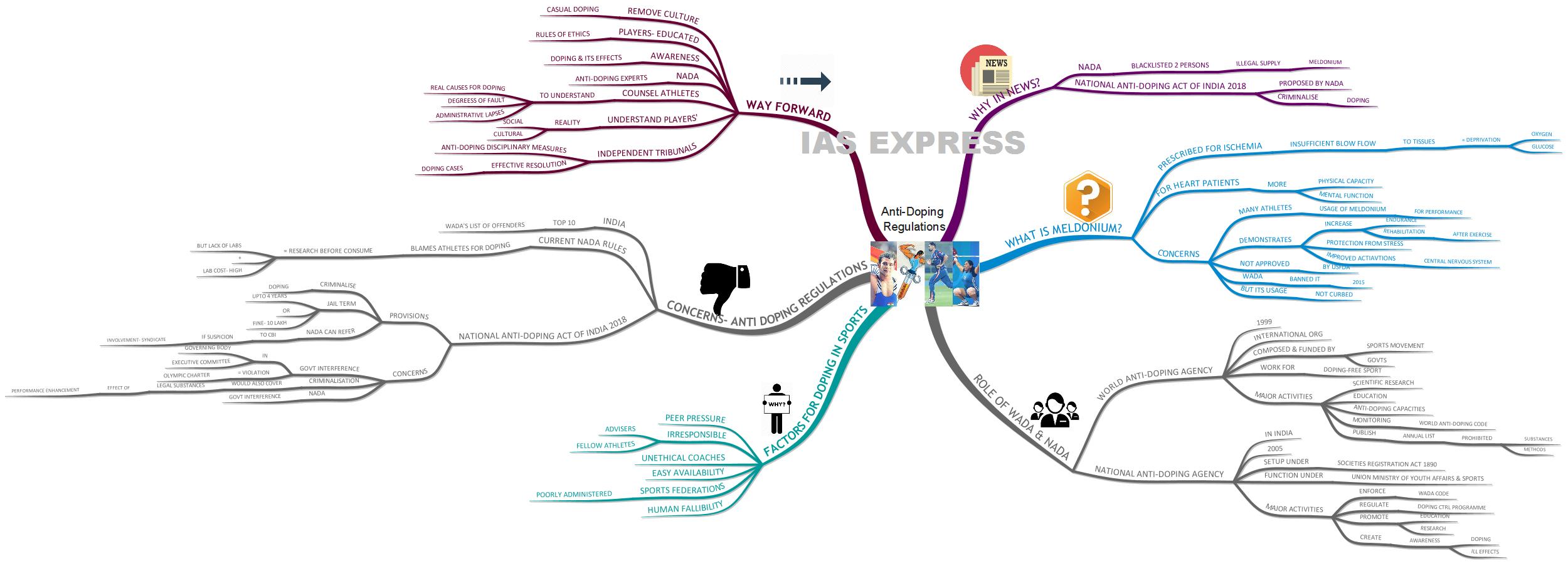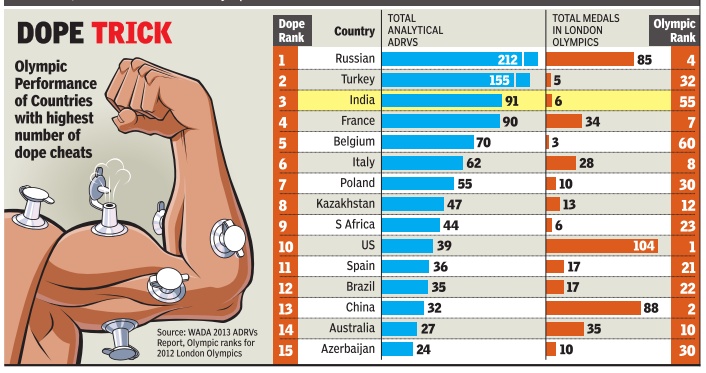Anti-Doping Regulations in India – Ensuring Ethics in Sports

From Current Affairs Notes for UPSC » Editorials & In-depths » This topic
IAS EXPRESS Vs UPSC Prelims 2024: 85+ questions reflected
Recently, the Anti-Doping Appeal Panel of the National Anti-Doping Agency (NADA) has blacklisted 2 persons with respect to the illegal supply of meldonium. Another bone of contention is the proposed ‘National Anti-Doping Act of India 2018’ which would criminalise doping as an offence. These issues highlight the need to relook at the status of anti-doping mechanism in India.
What is Meldonium?
- Meldonium is produced by the Latvian company Grindeks and is prescribed for ischemia, a disease in which there is an inadequate flow of blood to tissues = starvation of oxygen & glucose.
- Meldonium provides those patients with heart and circulatory conditions more physical capacity and mental function.
What are the concerns with its usage?
- As Meldonium aids in oxygen uptake and endurance, many athletes have been caught using it.
- Meldonium came to the spotlight when tennis superstar Maria Sharapova tested positive for it in 2016.
- A study on its functioning proves that the drug demonstrates
- An increase in endurance performance of athletes.
- Enhanced rehabilitation after exercise.
- Protection against stress.
- Improved activations of the central nervous system (CNS) functions.
- However, it is believed that the substance would not improve athletes’ performance in competition, and might even do the opposite.
- Even though the drug was not approved by USFDA (US Food & Drug Administration), it has been easily available over the counter in Eastern Europe and Russia.
- The World Anti-Doping Agency (WADA) listed it in the banned substances in 2015.
- But the usage of meldonium has not been curbed till now.
What is the role of WADA and NADA?
World Anti-Doping Agency (WADA) was set up in 1999 as an international independent organisation.
- It is composed and funded equally by the sports movement and governments across the world.
- It seeks to lead a collaborative international campaign for doping-free sport.
- Its major activities include scientific research, education, and development of anti-doping capacities and monitoring of the World Anti-Doping Code.
- World Anti-Doping Code is the document that provides consistency to anti-doping rules, regulations, and policies across the world.
- Since 2004 and as obligated by the World Anti-Doping Code, WADA has published an annual list of Prohibited Substances and Methods (List). The list, which constitutes one of the 6 international standards, finds out the substances and methods banned in and out of competition and in concerned sports.
In India, the National Anti-Doping Agency (NADA) is responsible for advancing, coordinating and supervising the doping control programme in sports in all its forms in the country.
- NADA was set up as a registered society under the Societies Registration Act of 1890 in 2005.
- It has a mandate for ensuring dope free sports in India.
- The major objectives of NADA are
-
- To enforce anti-doping rules under WADA code,
- Regulate doping control programme,
- To promote education and research and
- Creating awareness about doping and its ill effects.
-
- It comes under the Union Ministry of Youth Affairs and Sports.
What is the recent doping case in India?
- Jagtar (a decathlete) has been tested positive for Meldonium in 2017 Federation Cup in Patiala.
- He was banned for a maximum of 4 years for a 1st-time dope offense.
- His ban was recently been reduced from four years to two after he had given significant evidence that aided in capturing a ring of illegal/unlicensed sports drug suppliers at the Jawaharlal Nehru Stadium which serves as a hub of national and international sporting athletic activity in India.
- Therefore, the Anti-doping Appeal panel ordered NADA to issue a warning to be affixed on notice boards or websites of NADA with respect to the substances and the risk of procurement of any supplies by the athletes from illegal suppliers.
What are the factors for the rise of doping in sports?
- Peer pressure,
- Irresponsible advisers and fellow athletes,
- Unethical coaches,
- Easy availability,
- Poorly administered sports federations, and
- Human fallibility (the likelihood of making errors).
What are the concerns with anti-doping regulations in India?
In the WADA’s list of offenders, India comes under top 10 which is unique considering the fact that the levels of its sporting achievement are not that significant.
The NADA Anti-Doping Rules specifically state that it is the fault of the athlete if the supplements consumed are contaminated.
- An athlete is expected to conduct research before consuming any supplement.
- However, there is a lack of laboratories in India that carry out such specific tests on supplements,
- And if an athlete finds such a laboratory, the cost of carrying out the tests are high.
NADA recently proposed ‘National Anti-Doping Act of India 2018’ which would criminalise doping as an offence.
- As per the Act, any attempt to involve in the supply of prohibited substances to an athlete or having links to an organised crime syndicate involved in doping = jail term of up to 4 years or fine of Rs. 10 lakh.
- Under the proposed law, NADA can refer the matter to the CBI if it has a suspicion that an organised doping syndicate is involved in the supply of prohibited substances to sportspersons.
- However, these provisions generated much debate between the sports ministry and the Indian Olympic Association (IOA).
- IOA objected to the presence of union sports minister and the other ministry officials in the proposed governing body and the executive committee to be constituted by NADA under the Act = government interference = violation of Olympic charter.
- Moreover, IOA has objected to the government wanting to criminalise supply of prohibited substances to athletes considering the fact that few of legal substances which have the effect of performance enhancement (illegal) would not stand the general implications of a criminal act.
- IOA also maintains that the NADA should be autonomous and independent in nature.
Therefore, merely subjecting the accused athletes to the complex legal process before NADA is not a long-term solution.
What is the way forward?
- Making doping a criminal offence, is an unjustifiable idea which would subject athletes to an already crippled criminal justice system. Instead, the following measures should be taken to ensure ethical sports in India.
- Need to change the culture of casual doping amongst athletes.
- Along with zero tolerance for unethical and fraudulent practices, it is important to create an atmosphere where players are educated about the rules of ethics in terms of fairness, integrity, responsibility, and respect.
- Athletes, support staff, federations, sports medical personnel should be provided with well-conceived literature, consultation, and workshops regarding doping and its consequences.
- NADA’s initiatives need to be supplemented by a cadre of indigenous anti-doping experts.
- A framework must be established to effectively counsel athletes to understand the real causes, degrees of fault and administrative lapses.
- We must understand the socio-cultural reality of our sportspersons.
- There should be independent tribunals/entities for anti-doping disciplinary procedures for transparent and effective resolution of any doping-related cases.
These measures may show results only in the long-term, however, they should be necessarily taken right now to clean up an image of being doping riddled unethical sporting fraternity. If this is not given the kind of priority it deserves, then surely, it will negatively impact the sanctity and trust given to sports by millions of fans in a sporting crazy world.
If you like this post, please share your feedback in the comments section below so that we will upload more posts like this.




Please make this audio enabled